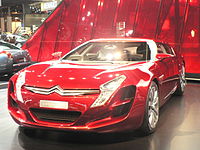Citroën concept cars
Appearance

There have been a number of concept cars by the French car manufacturer Citroën, produced to show future ideas and forthcoming models at international motor shows.
- Citroën Traction Avant 22 CV (1934), a 3.8-litre V8 version displayed at the Paris Motor Show in 1934 but never put into production
- Citroën G Van (1948), a prototype van
- Citroën Prototype C, a range of prototypes from 1955 to 1956, abandoned in favor of the Citroën Ami 6
- Citroën C60 Project (1960s), a prototype design for a model to sit between the 2CV and the DS, not formally a concept car; abandoned in favor of Project F
- Citroën Project F/Project AP (1963-1967), prototype design for a mid-range model to sit between the 2CV and the DS; the project's failure bankrupted Citroën and led to the merger with Peugeot in 1974
- Citroën Project G (1960s), developed from Project F, became the Citroën GS
- Citroën Mini-Zup (1972) - a two-seater city car powered by the 2CV 602cc engine[1]
- Citroën GS Camargue (1972)
- Citroën 2CV Pop (1973), the Pop, or Super, was the study for a luxurious version of the 2CV.[2] The car featured a special bonnet based on the Traction Avant, and the engine was the four-cylinder engine of the GS
- Citroën Buggy GS (1973)
- Citroën Prototype Y prototype became the Citroën Visa
PSA Peugeot Citroën era

From 1976, Citroën became part of the enlarged Peugeot SA group, known as PSA Peugeot Citroën.
- Citroën Karin (1980)
- Citroën Xenia (1981)
- Citroën Eco 2000 (1984)
- Citroën Aventure (1986)
- Citroën Eole (1986), shown at the 1986 Geneva Motor Show, a low drag (0.19Cd) body powered by a 1.5-litre engine[3]
- Citroën Zabrus (1986)
- Citroën Activa (1988)
- Citroën Activa 2 (1990)
- Citroën Scarabee D'Or (1990), 4x4 off road vehicle based on a shortened BX platform
- Citroën Citela (1992), a four-seater electric city car with interchangeable panels
- Citroën Xanae (1994), a compact five-seater MPV which previewed the design of the Picasso, launched five years later
- Citroën Tulip (1995), a 2-seater electric city car used in car sharing trials in Tours[4]
- Citroën Berlingo (1996), a trio of concepts shown at the 1996 Paris Motor Show: Berline Bulle (5-door supermini), Coupé de Plage (a 2-door pick up) and the Berlingo Grand Large which was the only one visually related to the 1996 production Berlingo
- Citroën C3 Air (1998), a 2-door cabriolet concept version of the C3, led to the Pluriel
- Citroën Calao (1998), a beach car based on the Berlingo
- Citroën C3 Lumière (1998), a 5-door supermini concept[5]inspired by the Citroën 2CV, previewing the design for the 2002 production Citroën C3
- Citroën C6 Lignage (1999), a precursor to the 2005 production Citroën C6, although the car was originally scheduled for launch before the end of 2001
- Citroën Démonstrateur Pluriel (1999), previewing the 2003 production C3 Pluriel
- Citroën Osmose (2000), a hybrid city car displayed at the 2000 Paris Motor Show, featuring a journey destination display on the side of the vehicle and indicate whether the driver is willing to pick up pedestrians heading in the same direction[6]
- Citroën C-Crosser (2001), a distinctive 5-door SUV, sharing nothing but name with the 2007 production C-Crosser[7]
- Citroën Osée (2001), a 3-seat rear-engined sports car designed by Pininfarina
- Citroën C-Airdream (2002), a 3-door coupe featuring drive-by-wire technology and powered by a 3.0-litre V6 engine
- Citroën C-Airlounge (2003), a large 5-door MPV with flexible interior layout[8]
- Citroën Bourlingueur (2003)
- Citroën C-SportLounge (2005), the design previewed the 2011 production Citroën DS5
- Citroën C-Airplay (2005)
- Citroën C-Buggy (2006)
- Citroën C-Métisse (2006)
- Citroën C-Cactus (2007)
- Citroën C5 Airscape (2007)
- Citroën Cruise Crosser (2007), six-wheeled all terrain prototype based on the C-Crosser
- GT by Citroën (2008)
- Citroën Hypnos (2008)
- Citroën DS Inside (2009)
- Citroën Revolte 2009 (2009)
- Citroën Metropolis (2010)
- Citroën Survolt (2010)
- Citroën Lacoste (2010)
- Citroën Tubik (2011), 9-seater van, styling influenced by the H Van
- Citroën Numero 9 (2012)
- Citroën Cactus (2013), previewed the 2014 production C4 Cactus
- Citroën Technospace (2013)
- Citroën CX-R (2014)
- Citroën DS Divine (2014)[9] A 4-door, 4-seater 4.21m compact car powered by a 1.6 266 bhp petrol engine from the Peugeot RCZ R[10]
- Citroën Berlingo Multispace (2015)
- Citroën Berlingo Mountain Vibe (2015)
- Citroën CXperience (2016)
- Citroën C-Aircross (2017), previewed the 2017 production C3 Aircross mini SUV
- Citroën Ami One (2019)
References
- ^ "Citroën Mini~Zup". Citroën Net. Retrieved 23 February 2015.
- ^ "Retro-styled 2CV Super (also known as 2CV Pop) prototype". Citroen Net. Retrieved 1 March 2015.
- ^ "Citroën Eole". Banovsky. 4 April 2015. Archived from the original on 19 September 2015. Retrieved 9 April 2015.
- ^ "The Tulip was Citroën's vision of the future in 1995". Citroen Net. 1998. Retrieved 25 February 2015.
- ^ "Citroën C3 Lumiere Concept (1998)". Old Concept Cars. 16 September 2014. Retrieved 25 February 2015.
- ^ "2000 Citroen Osmose". Car Styling. Retrieved 27 February 2015.
- ^ "Citroën C-Crosser". Citroen Net. 2001. Retrieved 25 February 2015.
- ^ "Frankfurt Motor Show 2003 Highlights". Car Design News. 17 October 2003. Archived from the original on 25 February 2015. Retrieved 25 February 2015.
- ^ "Citroen's bonkers new Divine DS". Top Gear. 5 September 2014. Retrieved 23 February 2015.
- ^ "Citroen Divine DS concept (2014): a posh VW Golf?". Car Magazine. 4 September 2014. Retrieved 31 May 2015.









